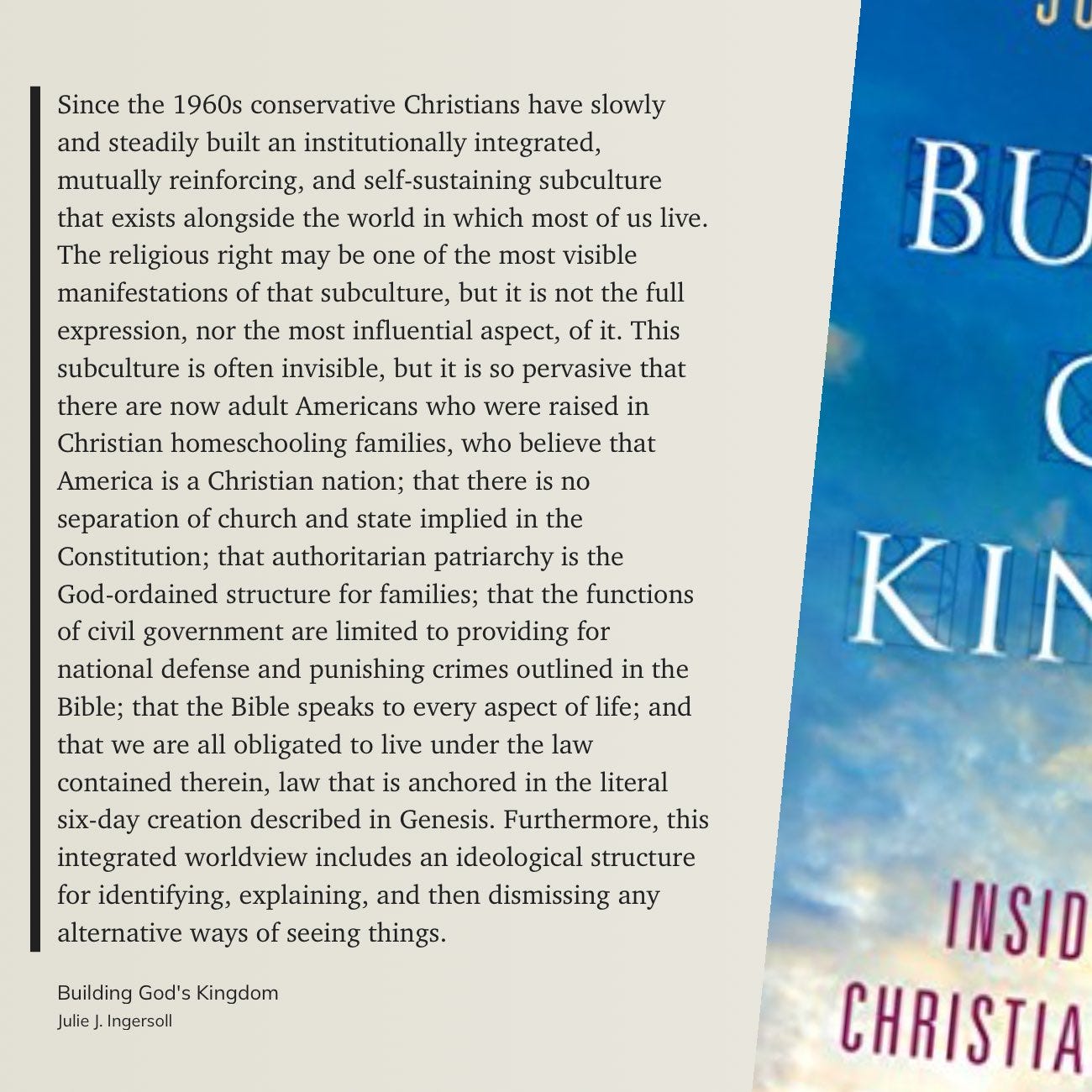As white evangelical hegemony ended, white Christian nationalist minority rule began.
Who needs hearts and minds when you have power?
White evangelicals in America have been heavily scrutinized—and rightly so—since the 2016 election cycle. Their widespread support of Trump & Trumpism escorted an unqualified, megalomaniacal, corrupt, amoral real estate “magnate” and reality-tv “star” to the White House.
Once Trump was ensconced there, white evangelicals enacted their longstanding sociopolitical agendas with alarming speed. The relationship was mutually beneficial. Trump knew that he owed his victory to white evangelicals, and white evangelicals knew they owed their ability to pursue their agenda to Trump’s permissiveness.
In response, people began speaking up. Online, there were hashtags like #exvangelical, #ChurchToo, #EmptyThePews, #ExposeChristianSchools, and others. In the press, journalists began exploring why white evangelicalism would support such a demagogue—to varying effect. In the broader book market, experts from various disciplines began interrogating white evangelicalism’s foundations, practices, and beliefs. Finally, the critical voices that have been present in academia for decades became more prominent.
Throughout this period, the favored status white evangelicals enjoyed within traditional media began to wane. While white evangelicals will claim that they are and have always been outsiders, that is categorically false—evangelicals have long-maintained access to traditional media, even during and after the Trump era.
In 2017, Tim Keller published the essay “Can Evangelicalism Survive Donald Trump and Roy Moore?” in The New Yorker, as a way to distance evangelicalism from its worst predilections, prejudices, and sins. Five years later, in 2022, David Brooks highlighted a number of “moderate” evangelicals (including Keller) who are trying to change evangelicalism from within.
Inherent biases and a predisposition toward assuming good intent also leads to softer coverage of religion, even as the cruelty of white evangelical Christianity was on display on a near daily basis. Whether it was the relentless pace of sex and abuse scandals within conservative evangelical churches, the increasing hold of conspiratorial thinking via QAnon in evangelical pews, or participation in propagating The Big Lie about the 2020 election—somehow, the religious angle is still missed.
There is a reticence among elected leaders to either publicly decry these harmful forms of Christianity, or to do the requisite homework to understand how Christian nationalism and supremacy led to the legislative outcomes being achieved at an increasing pace.
It is easy to conflate white evangelicalism, Christian nationalism, and the modern GOP because they have so many points of overlap and intersection. But we should be able to do two things simultaneously: naming specific harmful religious practices like Christian nationalism, while not vilifying or simplifying all other religious expression.
What is deeply frustrating is the level to which much of this work has already been done. I highlighted this on TikTok yesterday:
The video above highlights the work of Julie Ingersoll, who quite literally wrote the book on Christian Reconstruction. Here is the quote I reference in the video above, in full:
This scholarship is of increasing importance.
In the fall of 2020, I recorded season 1 of the Powers & Principalities podcast, which focused on white evangelicalism & Christian nationalism.
My guests included Diana Butler Bass, Katherine Stewart, Kristin Kobes Du Mez, Sam Perry, Andrew Whitehead, Julie Ingersoll, Sarah Posner, Robert P. Jones, Bradley Onishi, Anthea Butler, Jack Jenkins, Jeff Sharlet, Reza Aslan, and Chrissy Stroop.
Following the May leak of the Dobbs decision, I wrote this:
“These decades-long investments are paying dividends. You can couch and condition language however you like to make your critique precise - that this is the work of white Christian supremacists or Christian nationalists, that evangelicals, even white evangelicals, are no monolith, etc. But these ideas and these movements have found shelter within white evangelicalisms, plural, and those with political power are exacting their will on an unwilling public because they believe it is righteous and godly to do so.
In response, we do need to continue to find ways to work together - especially those of us who have an in-depth understanding of how white evangelicalism and other high-demand religions approach politics and public life - and formulate responses.
This will not end with the defeat of Roe, and culture wars are not merely rhetorical. They have real consequences. I am not prone to using metaphors that depend on conflict—especially something as loaded as “culture war.” But these conflicts are undeniable. The anti-CRT furor from last year, the anti-trans actions of 2022, all of these are proxies and expressions of the conflict that is already here.”
We have, belatedly, reached a point where white evangelicalism is no longer the default representation of “Christian” in the media.
We have also reached a far more precarious place: a place of Christian nationalist minority rule. And many of us are squabbling about whether or not these positions and decisions can be deemed “Christian” or not.
As Chrissy Stroop has been emphasizing in her work, “Christian” does not immediately equal “good.”
Their goal is not to be good. Their goal is to dominate. Through politics. Through religion. Through governance. Through violence. They are not coy about their goals.
The sooner the greatest number of people—Christian or ex-Christian, atheist or believer, spiritual or secular, or indifferent to labels—can understand that and find common ground to work together to organize and re-secure rights and privileges for all people, the better.
Thanks for reading. If you’re coming across this online, you can subscribe below to stay updated and support my work.






